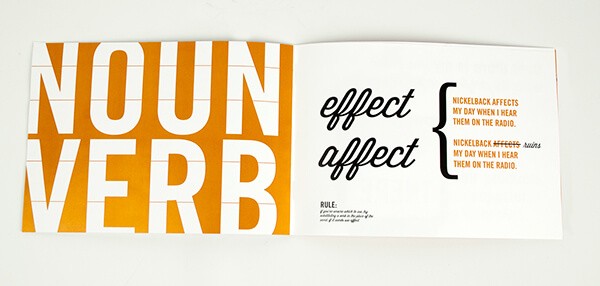Affect vs. Effect?
The word affect is often used as a verb to describe the influence of an event in the present or future tense. The word effect is commonly used as a noun to describe the subject of influence.
 October 11, 2019
October 11, 2019
 Grammar Tips
Grammar Tips
The word affect is often used as a verb to describe the influence of an event in the present or future tense. The word effect is commonly used as a noun to describe the subject of influence.
Distinguishing affect from effect is confusing for more reasons than one and are examples of the most misused words in the English language. For starters, people often pronounce affect and effect similarly, but when spoken fully, they are pronounced differently. The words affect and effect are examples of homonyms, which is a phonetic term for words that sound similar but carry different meanings.

The words affect and effect are often called homophones, which are words that sound the same but have different meanings. Affect and effect are pronounced differently, however, and the confusion toward their pronunciation and meanings may stem directly from where the speaker lives. People who grow up in English-speaking regions where the pronunciation of long-a vowels fall short may struggle the most with distinguishing words such as affect and effect.
For reference, affect is pronounced “af-fect” or “uh-fect,” with two syllables. Effect also uses two syllables, but is pronounced as “ef-fect,” or “eh-fect.”
The second reason deciphering between effect and affect is difficult is because both words are used as a noun or a verb. The English language often uses the verb form of affect, which describes an action of impact on another person, place, or thing. In contrast, the word effect is typically used as a noun to describe a change that occurs as a result of an action.
When using affect as a verb and effect as a noun, both words are used in the following phrases:
“The long-term effects of e-cigarettes remain largely unknown.”
“Our everyday actions can negatively affect our quality of life later on.”
“My behavior can affect others, just as their actions have an effect on mine.”
In regards to phrases or everyday references, affect and effect play important roles in how we convey information about specific subjects. For example, affect is used to describe the “flat affect,” an emotional response associated with schizophrenia. Related terms involving the study of emotions include affect theory, blunted affect, labile affect, and affective computing.
Effect is used, respectively, in terms involving the manipulation of something to create a change. Examples of effect in ideas or phrases include drug effects, special effects, or effects pedal.
Affect and effect can be a noun or a verb, but it’s important to remember is how affect is most common in verb form, and effect is often used as a noun. RAVEN is a mnemonic tool many grammar students use to remember the difference between affect and effect:
R: Remember
A: Affect
V: Verb
E: Effect
N: Noun
In the context of RAVEN, another simple way to remember the difference is to think about the order of the alphabet and the order of cause-and-effect:
A is for affect, and E is for effect.
In the Phoenician alphabet, A comes before E, and in the case of affect versus effect, the affect of something happens before the effect.
A → E
Affect → Effect
Cause → Result

Overall, there are three ways to define affect, which include two forms of a transitive verb and one noun form. Thus, the definition of affect depends entirely on the context of how you use it.
As the less-common noun, affect is used to describe observable and subjective emotions that are separate from one’s physical state of being. In most cases, however, the proper word to use in affect’s noun form is actually “effect.” For example,
“The students’ displayed abnormal test scores and affects, thereafter.”
Both transitive verb forms of affect are used as affects, affecting, and affected.
The first transitive verb form of affect is used to describe the action of creating an impact. More simply, it’s the action one takes on another person, place, or thing to produce an influence.
For example,
“The bikes affect her ability to walk.”
“The children were affected by the state’s budget cuts.”
The second transitive verb form of affect is less common but is used to infer a pretense, to assume a sense of influence or similarity, or to create a mental impression of something before it is known otherwise. Three examples of affect’s send verb form include:
“She affected innocence, but we know the truth.”
“The students affect a studious manner.”
“The seconds passing affect minutes and then hours.”
Similarly to affect, the word effect is found in noun and transitive verb form. The essential difference between either is that the noun form describes the result of an action, while the transitive verb describes how the action causes the result.
The first noun version of effect is used to describe an influential perception, result, or emotional outcome following an event. The effect of something can be psychological if it enables one to perceive something differently than before. Sometimes an effect is caused by an intentional event, such as a musical or theater performance.
“The black walls have an eerie effect on visitors.”
Effect can also represent the physical result of an event or the beginning of a task, or series of tasks. For example,
“The new HR rules go into effect on Monday.”
The second noun form of effect is found in similar phrases such as effectively, in effect, or to the effect. In such instances, effect is used to describe the essence or underlying virtue of something. Examples include:
“The lecture explored modernism while, effectively, describing Karl Marx’s definition of alienation.”
“The lecture explored modernism to what was in effect the definition of alienation.”
“The class read the manifesto to the effect of a constitutional amendment.”
The verb effect is used to describe an action that causes an end result. The verb form of effect is used synonymously with words like enacted, executed, or achieved. For example,
“The governor’s actions can effect change across the state.”
If a verb is an action word that makes something to-be, a transitive verb is a word that directly connects an action with the subject noun of the sentence. The sentence subject is the word the transitive verb actively works upon. Examples of transitive verbs include:
“My boss referred me to human resources.”
“The president spoke to the press.”
A mnemonic tool is used by students to help remember tricky lessons through letter patterns, such as RAVEN, rhymes, acronyms, or songs. The ABC song is an example of how we use mnemonics to remember our alphabet. Teachers use mnemonics for lessons involving mathematics, spelling, story writing, music, or colors.
The Word Counter is a dynamic online tool used for counting words, characters, sentences, paragraphs, and pages in real time, along with spelling and grammar checking.